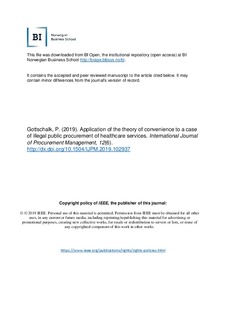Application of the theory of convenience to a case of illegal Public procurement of Healthcare services
Journal article, Peer reviewed
Accepted version
Permanent lenke
http://hdl.handle.net/11250/2630179Utgivelsesdato
2019Metadata
Vis full innførselSamlinger
- Publikasjoner fra CRIStin - BI [1015]
- Scientific articles [2181]
Originalversjon
International Journal of procurement management. 2019, 12(6), 621-631.Sammendrag
We address the following research question in this article: how can convenience theory in terms of motive, opportunity, and willingness explain deviant behaviour in the case of public procurement of healthcare services in a Norwegian municipality? This research is important, as it can identify motives at the individual and organisational level, opportunities at the organisational and societal level, and willingness at the individual level, even when there is not necessarily corruption involved. The application of convenience theory is by no means an excuse for violations of laws and regulations. Rather, this article demonstrates where prevention of misconduct and crime needs attention. It is particularly at the organisational level, where opportunity structures tend to enable commitment and concealment of illegitimate financial transactions. When auditing and other forms of control are de facto absent, where the blame game occurs, and where it is impossible to trace events because documents and e-mails have disappeared, then misconduct and crime become convenient options.
